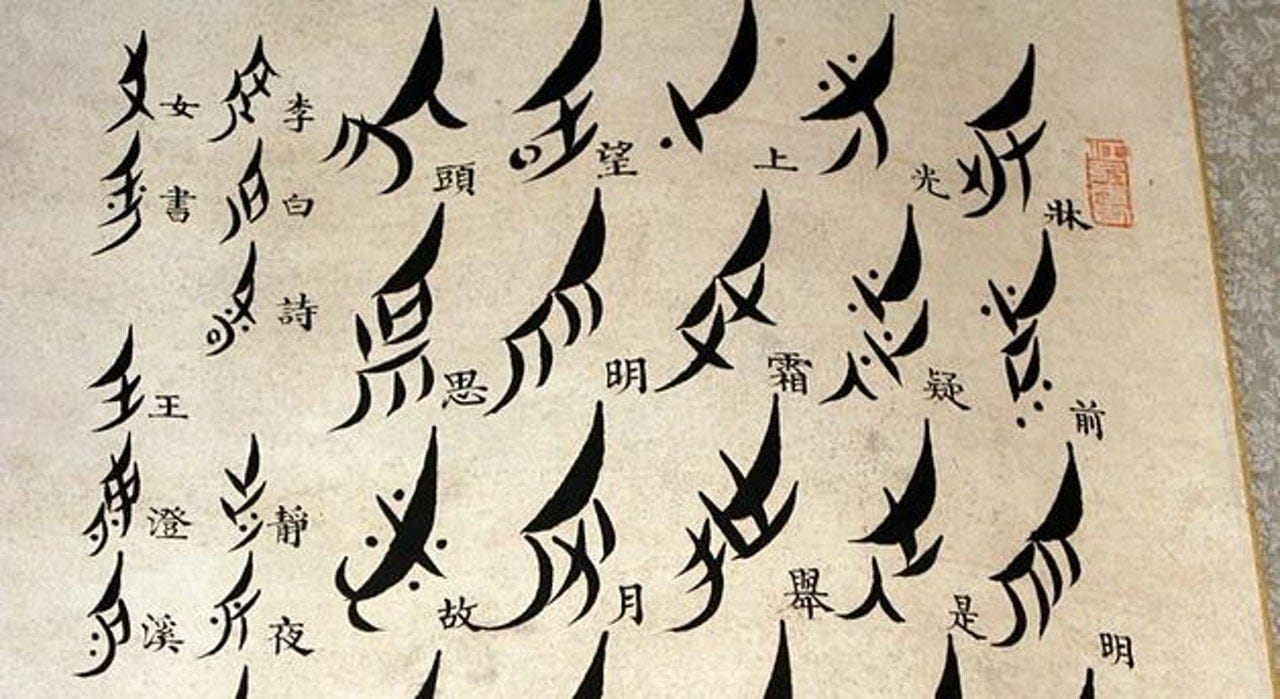The Secret Alphabet of Chinese Women
Ladies, wouldn't it be great to have a script of our own? ✍️👩
Idiom of the week: 独一无二 (dú yī wú èr)
指没有相同的或没有可以相比的。Means that something is unique or incomparable.
Similar idiom: 世界一绝 (Shìjiè yī jué): unparalleled in the world, unique on a global scale
If you love Chinese characters as much as we do, you know very well how complicated they are! Also, we all know that historically, women in China had less opportunities to learn how to read.
However, women in Hunan province found a unique way to deal with both problems: they developed a simple alphabet (字母, zìmǔ) of their own! It is called Nüshu (女书, Nǚshū), literally “women’s script”.
Nüshu was developed by Chinese women from Hunan province. Photo: hk01
女书是一种女性文字,是目前全世界独一无二的女性专用的奇特文字,堪称世界一绝。女书是流传在中国湖南省江永县 (Jiāng yǒng xiàn, Jiangyong County) 东北部,主要用于倾诉。有大量自传、纪事、民歌、转写作品传世。
奇特 (Qítè) - peculiar, strange, unique
堪称 (Kān chēng) - can be called
女书是目前全世界独一无二的女性专用的奇特文字,堪称世界一绝。Nüshu is a unique script that is currently the only one in the world used solely by women, and it can be said to be unparalleled in the world.
倾诉 (Qīngsù) - to confide, to say what is on one’s mind
自传 (Zìzhuàn) - autobiography
纪事 (Jìshì) - chronicle
民歌 (Míngē) - folk songs
转写 (Zhuǎn xiě) - transcribe
传世 (Chuánshì) - handed down from generation to generation
有大量自传、纪事、民歌、转写作品传世。There are a large number of autobiographies, chronicles, folk songs, and transcribed works handed down from generation to generation.
女书是记录当地汉语土话的表音文字。一个字符标记一组同音、近音词。每个人用400〜600字,就可以完整地记录当地土话。
土话 (Tǔhuà) - dialect
表音 (Biǎo yīn) - phonetic
音词 (Yīn cí) - phonetic words
记录 (Jìlù) - to record, a recording
女书是民间流行的女性文字,是“三寸金莲” 的妇女自然使用的交流工具,女书有其自身内在规律,而非外人规定、再造的。女书虽然是女性的专用文字,但女书是自由、自在、并非诡秘文字。
三寸金莲 (Sān cùn jīnlián) - foot-binding; a Chinese practice that involved tightly bandaging the feet of women to make them smaller for aesthetic purposes.
自身内 (Zìshēn nèi) - within oneself, internal
再造 (Zàizào) - to recreate
自在 (Zìzài) - free, unrestrained
诡秘 (Guǐmì) - mysterious
清华大学赵丽明 (Zhào Lìmíng) 教授认为,女书不仅仅是一种书写方式,它更代表了典型的中国传统女性文化,也如一缕阳光给女性生活带来愉悦。正如一位女书的主人说:“男人有男字(汉字)、男书、男文,他们是君子。我们有女字、女书、女文,我们是君子女。”
清华大学 (Qīnghuá Dàxué) - Tsinghua University
一缕阳光 (Yī lǚ yángguāng) - a ray of sunshine
愉悦 (Yúyuè) - pleasure, joy
君子 (Jūnzǐ) - gentleman
“男人有男字(汉字)、男书、男文,他们是君子。我们有女字、女书、女文,我们是君子女。"Men have male characters (Chinese characters), male scripts, and male texts, and they are gentlemen. We have female characters, female scripts, and female texts, and we are gentlewomen”
Photo: visitbeijing.com
More on “"三寸金莲” (Foot-binding)
Foot-binding was a harmful custom in ancient China. It involved wrapping of women's feet tightly with cloth to make them smaller and deformed. Generally, women would begin to have their feet bound when they were four or five years old, and the bandage would be untied when their adult bones were established. There were also women who had their feet bound for life.
三寸金莲(foot-binding,又称裹脚、缠小脚、裹小脚、扎脚),是中国古代一种陋习,是用布将女性双脚紧紧缠裹,使之畸形变小。一般女性从四、五岁起便开始缠足,直到成年骨骼定型后方将布带解开,也有终身缠裹者。
三寸金莲 (Sān cùn jīnlián, lit. “three-inch lotus”), 裹脚 (Guǒjiǎo)、缠小脚 (Chán xiǎojiǎo)、裹小脚 (Guǒ xiǎojiǎo)、扎脚 (Zhā jiǎo) - different names for foot-binding
陋习 (Lòuxí) - bad habit, wrong custom
缠裹 (Chán guǒ) - wrapped around
畸形 (Jīxíng) - deformity, malformation
终身 (Zhōngshēn) - lifelong
We wish you all more wholesome women’s scripts; and less foot-binding!
Antoine & Dorota






